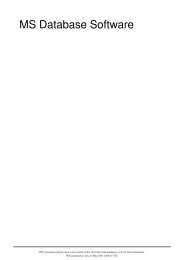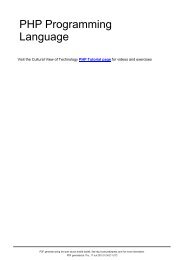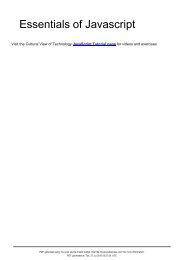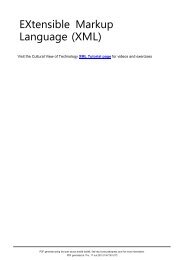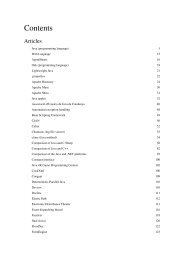- Page 1 and 2:
PHP Programming Language Visit the
- Page 3 and 4:
Gallery Project 73 Gamboo Web Suite
- Page 5 and 6:
Piwigo 248 Plogger 250 Pluck (softw
- Page 7 and 8:
Active Agenda 1 Active Agenda Stabl
- Page 9 and 10:
Active Calendar 3 • Using PHP nat
- Page 11 and 12:
Active Calendar 5 So if you would l
- Page 13 and 14:
Active Calendar 7 $cal->setEvent("2
- Page 15 and 16:
Adminer 9 The small single file is
- Page 17 and 18:
Aigaion 11 Annotation of publicatio
- Page 19 and 20:
Asido 13 Asido Developer(s) Kaloyan
- Page 21 and 22:
Asido 15 ?> External links • Asid
- Page 23 and 24:
Associate-O-Matic 17 References [1]
- Page 25 and 26:
Avactis 19 Avactis Developer(s) Pen
- Page 27 and 28:
Avactis 21 Notes • Paul Galloway.
- Page 29 and 30:
Beehive Forum 23 Beehive Forum Stab
- Page 31 and 32:
itcart 25 bitcart Developer(s) Bitw
- Page 33 and 34:
itcart 27 • Top Sellers Display
- Page 35 and 36:
BlueErp 29 BlueErp Developer(s) Ope
- Page 37 and 38:
BuddyPress 31 From the BuddyPress w
- Page 39 and 40:
ccHost 33 References [1] Nathan Wil
- Page 41 and 42:
Claroline 35 Partners Initially sta
- Page 43 and 44:
Comparison of knowledge base manage
- Page 45 and 46:
Comparison of knowledge base manage
- Page 47 and 48:
Comparison of knowledge base manage
- Page 49 and 50:
concrete5 43 History Development of
- Page 51 and 52:
Coppermine Photo Gallery 45 Referen
- Page 53 and 54:
DBG 47 DBG DBG is an open source de
- Page 55 and 56:
Doctrine (PHP) 49 Doctrine (PHP) St
- Page 57 and 58:
Doctrine (PHP) 51 See also • Prop
- Page 59 and 60:
Dokeos 53 Statistics and market sha
- Page 61 and 62:
dotProject 55 dotProject Developer(
- Page 63 and 64:
User:Drietsch/pimcore 57 User:Driet
- Page 65 and 66:
DynPG 59 Video tutorials There are
- Page 67 and 68: Elgg (software) 61 See also • Com
- Page 69 and 70: EpesiBIM 63 See also • SugarCRM
- Page 71 and 72: Flash Gallery 65 See also • Photo
- Page 73 and 74: Flash MP3 Player 67 See also • Co
- Page 75 and 76: FluxBB 69 Future development FluxBB
- Page 77 and 78: Frog CMS 71 Frog CMS Developer(s) P
- Page 79 and 80: Gallery Project 73 Gallery Project
- Page 81 and 82: Gamboo Web Suite 75 Gamboo Web Suit
- Page 83 and 84: Gateway Anti-Virus 77 Gateway Anti-
- Page 85 and 86: Group-Office 79 Group-Office Develo
- Page 87 and 88: Habari 81 Habari Developer(s) Habar
- Page 89 and 90: Habari 83 Development model 0.6.4 F
- Page 91 and 92: Horde (software) 85 Horde (software
- Page 93 and 94: HuMo-gen 87 Display Features Beside
- Page 95 and 96: IPBWI 89 IPBWI Developer(s) Matthia
- Page 97 and 98: Icy Phoenix 91 Icy Phoenix Develope
- Page 99 and 100: Icy Phoenix 93 External links • O
- Page 101 and 102: Injader 95 Injader Developer(s) Ben
- Page 103 and 104: Intelestream 97 Partners Intelestre
- Page 105 and 106: Invision Power Board 99 Invision Po
- Page 107 and 108: Invision Power Board 101 References
- Page 109 and 110: Joomla 103 Joomla Developer(s) The
- Page 111 and 112: Joomla 105 [1] http://Joomla.org/ [
- Page 113 and 114: Joomsef 107 External links • Offi
- Page 115 and 116: KnowledgeBase Manager Pro 109 [5] "
- Page 117: List of PHP accelerators 111 Zend P
- Page 121 and 122: Mambo (software) 115 Mambo (softwar
- Page 123 and 124: Mambo (software) 117 • The former
- Page 125 and 126: Mambo (software) 119 [19] "NYS Depa
- Page 127 and 128: Merlintalk 121 • 2008: Released m
- Page 129 and 130: MetaBB 123 References [1] http://fo
- Page 131 and 132: Midgard (software) 125 Midgard (sof
- Page 133 and 134: Midgard (software) 127 See also •
- Page 135 and 136: Midgard Lite 129 Midgard Lite Midga
- Page 137 and 138: MindTouch Deki 131 History MindTouc
- Page 139 and 140: MindTouch Deki 133 Users of the Com
- Page 141 and 142: Moodle 135 Moodle Moodle course scr
- Page 143 and 144: Moodle 137 show, it has been cited
- Page 145 and 146: Moodle 139 See also • Learning ma
- Page 147 and 148: MyBB 141 MyBB A default installatio
- Page 149 and 150: MyBB 143 free software released und
- Page 151 and 152: NETSOFTWARE 145 Structure of compan
- Page 153 and 154: User:Nichescript/Affiliate Niche Sr
- Page 155 and 156: Ning (website) 149 Feature modifica
- Page 157 and 158: Ning (website) 151 [11] http://blog
- Page 159 and 160: NolaPro 153 In May 2005, NolaPro wa
- Page 161 and 162: ocPortal 155 ocPortal Developer(s)
- Page 163 and 164: ocPortal 157 Version history • Ma
- Page 165 and 166: Open Realty 159 References [1] Open
- Page 167 and 168: Opus (content management system) 16
- Page 169 and 170:
osCommerce 163 osCommerce Developer
- Page 171 and 172:
osCommerce 165 Branches Distributed
- Page 173 and 174:
PEAR 167 External links • The PEA
- Page 175 and 176:
PHP syntax and semantics 169 Colon
- Page 177 and 178:
PHP syntax and semantics 171 } { $d
- Page 179 and 180:
PHPClasses repository 173 PHPClasse
- Page 181 and 182:
PHPDoc 175 markup for display forma
- Page 183 and 184:
PHPDoc 177 The text that marks this
- Page 185 and 186:
PHPDoc 179 @static Documents a stat
- Page 187 and 188:
PHPEclipse 181 Further reading •
- Page 189 and 190:
User:Papagel/EFront (eLearning soft
- Page 191 and 192:
Phalanger (compiler) 185 Phalanger
- Page 193 and 194:
pHAML 187 pHAML Developer(s) David
- Page 195 and 196:
pHAML 189 Hello World Hello W
- Page 197 and 198:
Phoca Gallery 191 References [1] ht
- Page 199 and 200:
PHP 193 PHP Paradigm imperative, ob
- Page 201 and 202:
PHP 195 Licensing PHP is free softw
- Page 203 and 204:
PHP 197 Security The National Vulne
- Page 205 and 206:
PHP 199 $adder = getAdder(8); echo
- Page 207 and 208:
PHP 201 Speed optimization PHP sour
- Page 209 and 210:
PHP 203 [18] "GoPHP5" (http://gophp
- Page 211 and 212:
HipHop for PHP 205 HipHop for PHP D
- Page 213 and 214:
PHP-GTK 207 PHP-GTK Developer(s) An
- Page 215 and 216:
PHP-GTK 209 External links • Offi
- Page 217 and 218:
PHP-Nuke 211 • News—Manages new
- Page 219 and 220:
Php4delphi 213 Php4delphi Appeared
- Page 221 and 222:
phpDocumentor 215 phpDocumentor Sta
- Page 223 and 224:
PhpGedView 217 PhpGedView can be ex
- Page 225 and 226:
phpLDAPadmin 219 phpLDAPadmin Origi
- Page 227 and 228:
phpMyAdmin 221 Release 0.9.0 Septem
- Page 229 and 230:
phpMyAdmin 223 References [1] http:
- Page 231 and 232:
phpPgAdmin 225 phpPgAdmin Stable re
- Page 233 and 234:
PhpXCore 227 PhpXCore Stable releas
- Page 235 and 236:
phpBB 229 Work on phpBB 3.0.x began
- Page 237 and 238:
phpBB 231 phpBB3 phpBB3 is the curr
- Page 239 and 240:
phpBB 233 The Development Team has
- Page 241 and 242:
phpBB 235 phpBB Community phpBB is
- Page 243 and 244:
phpBB 237 [45] phpBB (2009-07-29).
- Page 245 and 246:
phplist 239 phplist Developer(s) Mi
- Page 247 and 248:
phplist 241 Translations The admini
- Page 249 and 250:
PHPmotion 243 Current status Versio
- Page 251 and 252:
PhpWiki 245 See also • List of wi
- Page 253 and 254:
Pimcore 247 Reviews and Articles
- Page 255 and 256:
Piwigo 249 Main Features Categories
- Page 257 and 258:
Pluck (software) 251 Pluck (softwar
- Page 259 and 260:
Pluck (software) 253 Vulnerabilitie
- Page 261 and 262:
PmWiki 255 Wiki structure In PmWiki
- Page 263 and 264:
PrestaShop 257 PrestaShop Stable re
- Page 265 and 266:
PrestaShop 259 • Real-time curren
- Page 267 and 268:
Project Zero 261 Project Zero Devel
- Page 269 and 270:
Propel (PHP) 263 Propel (PHP) Prope
- Page 271 and 272:
QPHP Framework 265 Data validation
- Page 273 and 274:
Quick.Cart 267 Support It is suppor
- Page 275 and 276:
Ravennuke 269 Ravennuke Developer(s
- Page 277 and 278:
ReOS 271 ReOS Developer(s) Elazos S
- Page 279 and 280:
RefDB 273 RefDB Developer(s) RefDB
- Page 281 and 282:
efbase 275 References [1] http://ww
- Page 283 and 284:
ResourceSpace 277 ResourceSpace Res
- Page 285 and 286:
Robogallery 279 Robogallery Develop
- Page 287 and 288:
RoundCube 281 RoundCube Developer(s
- Page 289 and 290:
SWiZ 283 SWiZ SWiZ (simple visualis
- Page 291 and 292:
Seagull PHP Framework 285 Seagull P
- Page 293 and 294:
Seagull PHP Framework 287 Reference
- Page 295 and 296:
Serendipity (software) 289 It's goi
- Page 297 and 298:
SilverStripe 291 Features Notable f
- Page 299 and 300:
SilverStripe 293 Recognition Awards
- Page 301 and 302:
Simple Cloud API 295 Simple Cloud A
- Page 303 and 304:
Simple Machines Forum 297 Simple Ma
- Page 305 and 306:
Simple Machines Forum 299 Modificat
- Page 307 and 308:
SimpleXML 301 SimpleXML SimpleXML i
- Page 309 and 310:
Simply AJAX Forum System (SAFS) 303
- Page 311 and 312:
SocialEngine 305 • Games • Sear
- Page 313 and 314:
SquirrelMail 307 Platforms Squirrel
- Page 315 and 316:
SquirrelMail 309 References [1] "Sq
- Page 317 and 318:
Squiz 311 MySource Matrix in Use My
- Page 319 and 320:
SugarCRM 313 Deployment types Sugar
- Page 321 and 322:
Symfony 315 Technical Symfony makes
- Page 323 and 324:
Symfony 317 See also • Comparison
- Page 325 and 326:
Textpattern 319 Textpattern Develop
- Page 327 and 328:
Textpattern 321 • TXPQ Magazine [
- Page 329 and 330:
TikiWiki 323 Major components TikiW
- Page 331 and 332:
TinyWebGallery 325 TinyWebGallery D
- Page 333 and 334:
Torpor (PHP) 327 External links •
- Page 335 and 336:
TYPO3 329 TYPO3 TYPO3 4.1 backend m
- Page 337 and 338:
TYPO3 331 TemplaVoila TemplaVoila i
- Page 339 and 340:
UBB.threads 333 Version 7.x While G
- Page 341 and 342:
Ubercart 335 Ubercart Developer(s)
- Page 343 and 344:
uddeIM 337 uddeIM Developer(s) Step
- Page 345 and 346:
uddeIM 339 References • Official
- Page 347 and 348:
vBulletin 341 vBulletin Developer(s
- Page 349 and 350:
vBulletin 343 • A database-stored
- Page 351 and 352:
vBulletin 345 vBulletin Blog Now in
- Page 353 and 354:
vBulletin 347 External links • vB
- Page 355 and 356:
Vwar 349 License Virtual War is not
- Page 357 and 358:
WakkaWiki 351 References [1] http:/
- Page 359 and 360:
Website Baker 353 WebsiteBaker vers
- Page 361 and 362:
Website Baker 355 Translations In t
- Page 363 and 364:
WebWM 357 WebWM Development status
- Page 365 and 366:
WikkaWiki 359 Wikka vision Compared
- Page 367 and 368:
WordPress 361 WordPress Developer(s
- Page 369 and 370:
WordPress 363 On December 12, 2008,
- Page 371 and 372:
WordPress 365 See also • Comparis
- Page 373 and 374:
Xaraya 367 Xaraya Initial release N
- Page 375 and 376:
Xdebug 369 Xdebug Developer(s) Deri
- Page 377 and 378:
XOOPS 371 XOOPS Developer(s) The XO
- Page 379 and 380:
XOOPS 373 See also search engines.
- Page 381 and 382:
YHM (software) 375 YHM (software) D
- Page 383 and 384:
Your Free Community 377 Your Free C
- Page 385 and 386:
Your Free Screamer 379 Your Free Sc
- Page 387 and 388:
Zen Cart 381 Zen Cart Original auth
- Page 389 and 390:
Zend Certified Engineer 383 Zend Ce
- Page 391 and 392:
Zend Framework 385 Zend Framework D
- Page 393 and 394:
Zend Framework 387 The Simple Cloud
- Page 395 and 396:
Zend Technologies 389 Zend Server C
- Page 397 and 398:
Zenphoto 391 Zenphoto Developer(s)
- Page 399 and 400:
Zikula 393 Zikula Developer(s) Ziku
- Page 401 and 402:
Article Sources and Contributors 39
- Page 403 and 404:
Article Sources and Contributors 39
- Page 405 and 406:
Article Sources and Contributors 39
- Page 407 and 408:
Article Sources and Contributors 40
- Page 409 and 410:
Image Sources, Licenses and Contrib
- Page 411 and 412:
Image Sources, Licenses and Contrib



